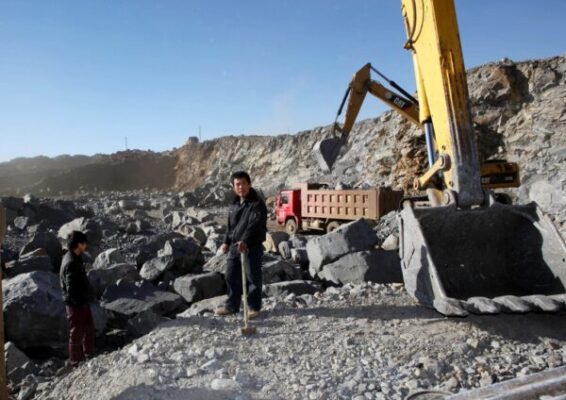Environmental groups in the north of Myanmar say a surge of illegal mining for rare earths has occurred in Kachin State close to the Chinese border since the coup on February 1.
Activists have complained about a rapid influx of Chinese workers since the country’s political turmoil erupted and that many trucks are lugging fertilizer bags loaded with minerals from illegal mines in Pangwa and Chipwi townships across the border.
China gets significant imports of medium and heavy rare-earth minerals from Myanmar. Irrawaddy, a news website run by long-time Burmese exiles in Thailand, said the Global Times quoted Chinese customs data showing that imports of rare earths rose by 23% in 2020 to around 35,500 tons.
Irrawaddy quoted an activist saying the number of trucks carrying rare earths had risen from one to two a day to 10 to 15 and the material was crossing the border “easily” despite the Covid-19 alert.
A spokeswoman for TANK, the Transparency and Accountability Network Kachin, said there had been an influx of Chinese miners and trucks carrying the rare earth material were leaving “day and night”.
The group says there are around 10 rare earth mines near Zam Nau, an area controlled by the New Democratic Army Kachin, a local militia aligned the the Myanmar military, which has deterred state mining officials from intervening.
More than 20 villages have reportedly suffered polluted water and soil because of illegal digging. Environmental groups say the Chipwe River turned red on two occasions due to mining waste.
Given that the Kachin Independence Army is currently fighting government forces (and has been since the ceasefire was broken in 2014), this controversial exploitation of local resources – which includes vast amounts of jade and timber as well – appears likely to continue.
On Monday May 3, the KIA appeared to have a small victory, when its troops shot down a military helicopter while conducting strikes in Momauk, where there has been fighting for several weeks. The Myanmar army is seeking to recapture Alaw Bum base on a hill on the Chinese border. It is is strategically important for areas between Bhamo and Myitkyina.
Battle for Kachin States’ resources, notably jade
Many analysts say this fighting is a battle for control of resources – but more likely jade than rare earths. The size of the jade industry dwarfs almost any other in Myanmar, except perhaps the drug trade from the Golden Triangle, which UNODC says could top US$40 billion a year.
An investigation by the London-based anti-corruption NGO Global Witness – Jade: Myanmar’s “Big State Secret” – estimated the the jade industry was worth up to $31 billion in 2014 alone – equivalent to nearly half of the entire country’s GDP.
Yet the proceeds were secretly controlled by notorious military figures and drug lords, it said, while local people got little benefit. This is widely known.
There has been speculation that Aung San Suu Kyi wanted to reform the jade sector, which has also been plagued with rampant drug use and regular tragedies, generally caused by landslides at mining sites, which have claimed hundreds of lives.
Groups in Kachin State had been calling for the NLD government to freeze licences and take control of the sector to end the huge social and environmental costs.
The struggle over jade is perhaps the major driver of armed conflict between the Myanmar army and the Kachin Independence Organisation and its military wing the KIA. They want the state’s jade riches shared and managed so they can have a lasting peace.
Cost of the coup
Meanwhile, the cost of the February 1 coup for ordinary citizens and companies that invested in Myanmar continues to soar.
Up to 25 million people – half the country – could drop into poverty by the end of the year because of the impact of the Covid pandemic and the political crisis, the UN Development Programme warned on Friday.
A study at the end of last year, showed that 83% of households reported that their incomes had been cut almost in half due to the pandemic.
The number of people living below the poverty line is estimated to have increased by 11 percentage points due to socio-economic effects of the pandemic. And the deteriorating rights and security situation since the coup is expected to drive the poverty rate up by a further 12 percentage points this year.
Foreign investors have been hammered as well.
On Tuesday May 4, Norway’s telecom giant Telenor said it had written off the value of its Myanmar operation in light of the country’s deteriorating security and human rights situation. “We have fully impaired Telenor Myanmar with an amount of 6.5 billion Norwegian krona ($783 million),” the company said.
Asian Times Financial With reporting by Reuters




